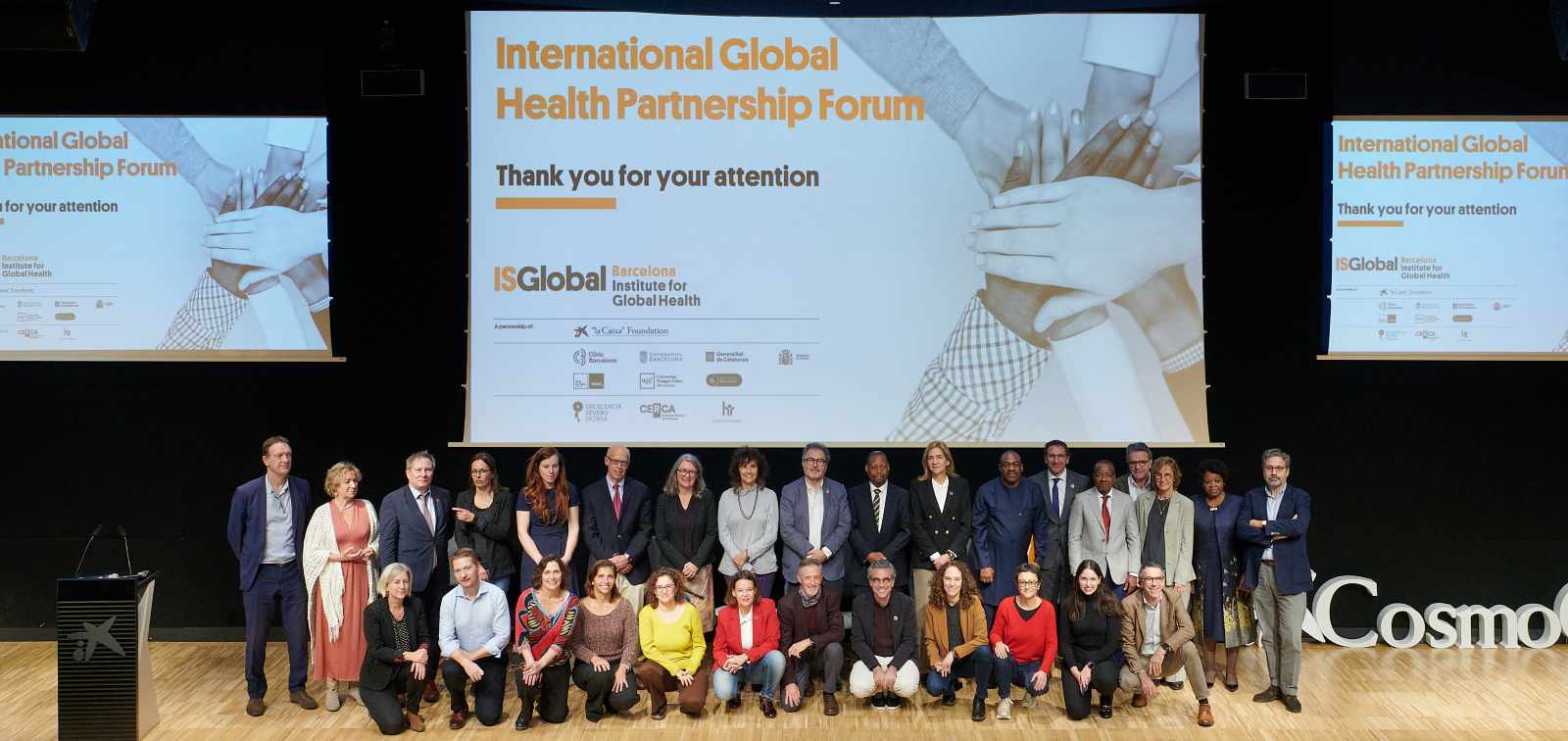Strengthening partnerships is key to tackling global health challenges
ISGlobal presents its main strategic orientations at an event that underlines the need to strengthen cooperation and equity in global health
30.11.2023
Forging global partnerships, promoting innovative approaches and putting equity at the centre are some of the key elements to address the global health challenges we face today. This was one of the main conclusions of the "International Global Health Partnership Forum", the meeting organised by ISGlobal on 28 November at the CosmoCaixa in Barcelona. The event, which served to present the institution's new strategy until 2027, also offered different perspectives on the main health challenges identified by ISGlobal today.
A strategy adapted to today's health challenges
After the opening address by the President of the Board of Trustees and Director of the International Area of the ”la Caixa” Foundation, HRH the Infanta Cristina of Spain, and the speeches by Carmen Cabezas, Secretary for Public Health of the Government of Catalonia, and Antón Leis, Director of the Spanish Agency for International Development Cooperation (AECID), ISGlobal's new strategic orientations for the period up to 2027 were presented. Antoni Plasència, Director General of ISGlobal, highlighted the organisation's unique and solid position to address current and future global health challenges, while Denise Naniche, scientific director, emphasised the need to adjust the new strategy taking into account the setbacks in achieving the Sustainable Development Goals (SDGs).
Samba Sow, Director General of the National Institute of Public Health of Mali and President of the PANTHER platform, then stressed that "the principle of equity is the basis for forging partnerships" and emphasised the need to decolonise science and global health and to strengthen community involvement. In this context, he underlined African countries' aspirations for self-reliance and the need for the continent to move from being a passive recipient of aid to an active partner in the search for sustainable solutions.
An effective and equitable preparedness and response model
"After COVID-19, there will be more crises, pandemics and disasters. We need sustainable preparedness and response plans and common protocols that can be adapted to each crisis," said Elisabeth Cardis, Head of ISGlobal's Radiation Group, at the start of the first panel. Katherine Ginsbach of the O'Neill Institute stressed the importance of regulation, while Helena Legido-Quigley of Imperial College London urged assessing countries' preparedness beyond infrastructure, with leadership as a key element. Olivier Morgan of the World Health Organization (WHO) highlighted the complexity of risk assessment and called for an interdisciplinary and multi-sectoral approach.
Access to innovation in the Global South
The second panel focused on innovation priorities in the Global South. Martinho Dgedge, President of the Manhiça Foundation, highlighted Africa's progress against malaria, AIDS and tuberculosis, the challenges of diagnosing and treating chronic diseases such as cancer, and the need for capacity building in the region. For his part, Unitaid's Executive Director, Phillipe Duneton, pointed out that the business models of the global North, based on low volumes and high prices, are not adaptable to the global South, which needs high volumes at low prices. Finally, there was consensus on the need for technology to be accessible to all communities.
An integrated approach to the global health crisis
The final panel of the day explored the intersection of climate and health. After Ivana Cvijanovic of ISGlobal reviewed the evidence that climate change is man-made and we are at a critical point, Maria Neira, WHO's Director for Public Health and the Environment, sought to send a positive message by pointing to the enormous health benefits of addressing the causes of climate change. But to do so, "we need real cooperation between public and private entities, coordinated action," urged Benoit Miribel of the One Sustainable Health for All Foundation. The One Health approach was also echoed by Carla de Freitas Campos of Fiocruz, in the previous panel.
Strong partnerships for better global health
In the closing session, Annette Petters, Chair of ISGlobal's External Advisory Board, summed up the day's proceedings and spoke about the organisation's new strategic plan, designed to address all the challenges raised throughout the day. Finally, Quique Bassat, who has been appointed as ISGlobal's Incoming Director General, closed the event by reinforcing the message that it is essential to build bridges and solid alliances with our partners if we are to advance ISGlobal's mission in such a complex context. This event, focusing on issues of particular relevance to ISGlobal and global health, is planned to be held every two years and will involve partners and collaborators from all over the world.
Recognising commitment to ISGlobal
On the eve of the event, a dinner attended by all the speakers, as well as other ISGlobal partners and staff, paid tribute to the outgoing chairs of the External Advisory Committee, David Savitz and Marcel Tanner. Both were named ISGlobal Honorary Professors in recognition of their dedication and commitment to the institution and were presented with a diploma and a commemorative illustration.



